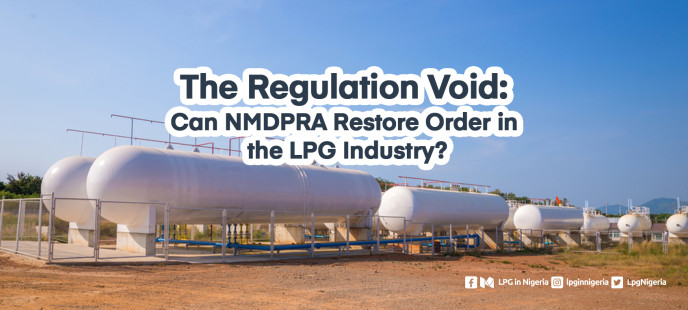- 2812
- 2
Sharing Ideas and Updates on LPG in Nigeria and related information to enable effective collaboration within the LPG Value Chain
The Regulation Void: Can NMDPRA Restore Order In The LPG Industry?

The Nigerian LPG sector is undergoing rapid expansion, but it’s also facing a deepening crisis: a breakdown in regulation. At the center of this issue is the Nigerian Midstream and Downstream Petroleum Regulatory Authority (NMDPRA), a body that was designed to oversee safety, licensing, and market stability—but which many operators now believe is failing in its duties.
From recent conversations in the LPG in Nigeria community, a consistent theme emerges: “LPG has no control and supervision. Just do as you like, buy tank, put anywhere.” This troubling statement reflects a regulatory environment where enforcement is weak, oversight is patchy, and the risk to public safety is growing by the day.
The Rise of Unregulated Operators
Over the past few years, the rush to join the LPG industry has led to a surge in new players—many of whom are setting up unlicensed and illegal gas plants in residential neighborhoods, under high-tension wires, or with substandard infrastructure. This uncoordinated expansion is eroding trust in the system and increasing the risk of catastrophic incidents.
The absence of a strong inspection and monitoring framework by NMDPRA has allowed this to fester. Industry insiders lament that “85% of Gas plants and skids in Nigeria are unlicensed and unregulated,” with some operators using poorly fabricated tanks and cylinders sourced from informal workshops.
Consequences of Lax Regulation
The impact of weak regulation is far-reaching:
Safety Hazards: Poorly installed tanks, non-compliant dispensers, and decanting practices in densely populated areas have led to multiple fatal explosions in recent years.
Market Saturation and Distortion: Licensed operators struggle to compete with illegal plants that bypass fees and safety protocols, thereby selling gas at lower prices.
Public Health Risks: Substandard storage and handling increase the likelihood of gas leaks, environmental contamination, and chronic exposure to dangerous fumes.
The Role of NMDPRA: Where Are the Gaps?
Established under the Petroleum Industry Act (PIA), NMDPRA is tasked with licensing, supervising safety standards, enforcing siting regulations, and promoting sustainable gas use. However, feedback from stakeholders suggests that the Authority is either overwhelmed or under-resourced, leaving the industry exposed.
There is little to no visible action against violators. Enforcement appears reactive rather than preventive, and site approvals are allegedly being issued without proper impact assessments or community engagement.
What Needs to Be Done
To restore order and confidence in Nigeria’s LPG sector, NMDPRA must:
1. Audit All Existing Plants: An urgent nationwide audit of licensed and unlicensed gas facilities is needed, with closures or upgrades mandated for non-compliant plants.
2. Enforce Siting Guidelines: Plants located near residential areas, schools, or power lines should be relocated or decommissioned.
3. Crack Down on Decanting: Illegal roadside cylinder refilling must be eliminated through patrols, whistleblowing incentives, and harsh penalties.
4. Strengthen Licensing Requirements: Only operators with proper training, equipment, and infrastructure should be licensed to run gas businesses.
5. Public Awareness Campaigns: Educating the public about the risks of using unregulated outlets will reduce patronage and drive demand toward safe, verified businesses.
Conclusion: Enforcement Is Not Optional
Without immediate regulatory intervention, Nigeria’s LPG sector could become a breeding ground for disaster. The growth of the industry must be matched with strict compliance to safety, quality, and siting standards. NMDPRA must step up—not just for market sanity, but for the protection of lives and property.
As one stakeholder aptly said, “When disaster happens, everyone will be affected—both licensed and unlicensed.” It’s time for the regulators to act.
Hence, the regulators can work with the various associations in the industry to report the culprits.
















John
11 June 2025 - 10:19amMy take the fees for registration is too high to start with as mini gas plant the process need to be open using online application time line to each process open and transparent process that way more people will be open to get license using 3rd party consultant increase cost most small businesses owners don't have such funds.
Nice write up to be awareness
Reply